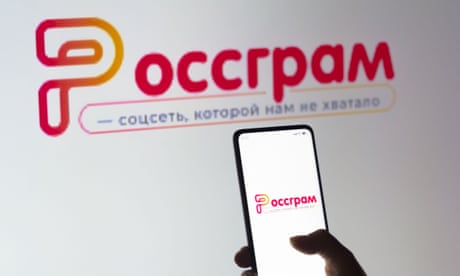- by foxnews
- 11 Jan 2025
‘Embarrassing’: Russia scrambles to copy banned social media platforms
‘Embarrassing’: Russia scrambles to copy banned social media platforms
- by theguardian
- 01 Apr 2022
- in technology

The creators of Rossgram call it Russia's answer to Instagram. Its critics call it "absolute shit".
As Russia continues its invasion of Ukraine, opportunistic developers have rolled out a suite of locally made social networks to replace services such as Instagram that have been blocked by the government, or YouTube, which is under growing pressure.
Many appear to be hasty imitations or include obvious attempts at surveilling ordinary Russians, as the Kremlin tries to censor news about the war and further clamp down on dissent under the country's president, Vladimir Putin.
"We are very sad that many good and popular services for different reasons are halting their work in Russia", wrote the creators of Grustnogram, which translates roughly as Sadgram, a parody (but working) social network where Russians can post black-and-white selfies to lament Russia's growing online isolation and "grieve together".
"We are even sadder about what absolute shit is sometimes being offered up as substitutes", the creators wrote.
Already, some Russian state media and government agencies have begun moving their videos to RuTube, a YouTube alternative owned by the state-run Gazprom-Media.
Even before the outbreak of the war, Russian authorities had been offering money to Russian influencers to switch over to the platform, a recent investigation showed. Uploads are reviewed by moderators before going on the site, but Russians who sign up through a government website that includes passport data can be "authorised".
NashStore, a Russian replacement for Google Play that takes the Mir payment system, a local alternative to Visa and Mastercard, is reportedly due to launch on May 9, the Victory Day holiday that has become the main patriotic holiday under Putin.
The standard-bearer for the domestics apps is Rossgram, which was announced shortly after Russia declared Instagram's creator, Meta, an extremist organisation earlier this month.
Instead of releasing a fully usable site this week, the Russian developers instead gave a short preview.
It looked a lot like Instagram, including a similar colour scheme, icons and other trademark features.
That may fly in Russia now, where the government on Wednesday announced that it would begin to ignore copyright restrictions in a policy it calls "parallel imports" that essentially legalises intellectual piracy.
"The goal of this mechanism is to satisfy the demand for [intellectual] goods", said Mikhail Mishustin, the Russian prime minister. "Until now, we couldn't sell [them] on the territory of our country without the agreement of the copyright holder."
The list of products, which will probably include films, television shows and video games, will be drawn up by a Russian government agency.
The policy essentially reverses decades of efforts to crack down on bootleg movies and other content available in underground shops or on social networks like VKontakte, which had boasted of its efforts to remove illegal uploads in recent years.
Putin on Wednesday also ordered government agencies to cease orders of foreign operating systems, which will include popular products from Microsoft, in the "interests of securing the technological independence and safety of Russia's critical information infrastructure". Russian government offices were ordered to stop using foreign operating systems by 2025.
For now, however, some Russian officials and even agencies like the Ministry of Defence have continued to use applications like Facebook despite the official decision banning Meta, its parent company.
Alexander Tokarev, the creator of Grustnogram, said that he was inspired to create the service after watching to roll out of Rossgram. Altogether, it took four people working for seven days around their normal jobs to put together the site, he said.
"The idea came to mind when I saw Rossgram", he told a local news site. "It was so embarrassing and ridiculous that I had an irresistible desire to make a response. This, of course, is primarily a statement. Because no one needs a Russian analogue [for Instagram] - it's absurd."
- by foxnews
- descember 09, 2016
TSA reveals top unusual finds at airport security checkpoints in 2024
The Transportation Security Administration released the "top catches" from 2024 with prohibited items found by agents across the country. See some tips for travelers.
read more





